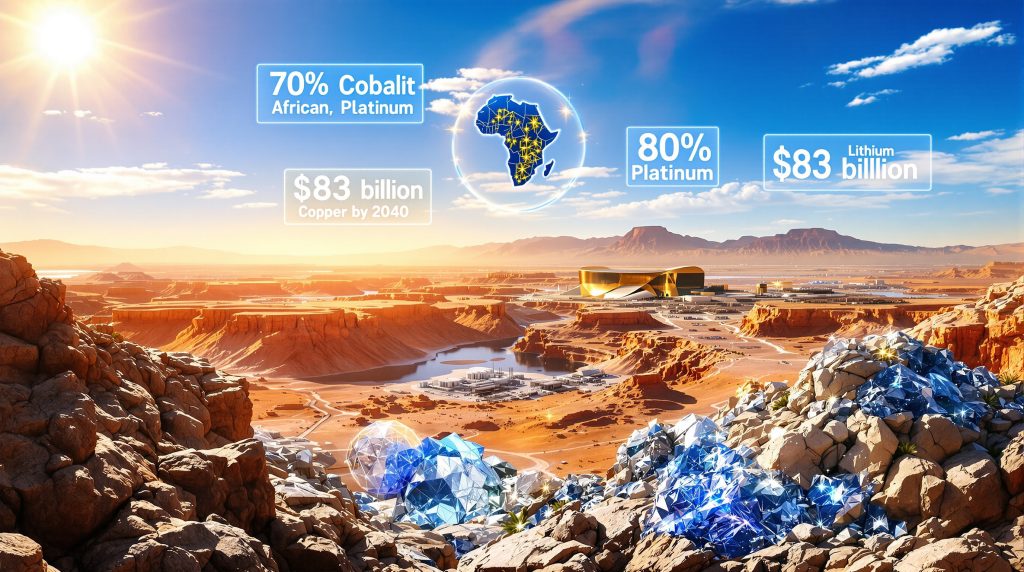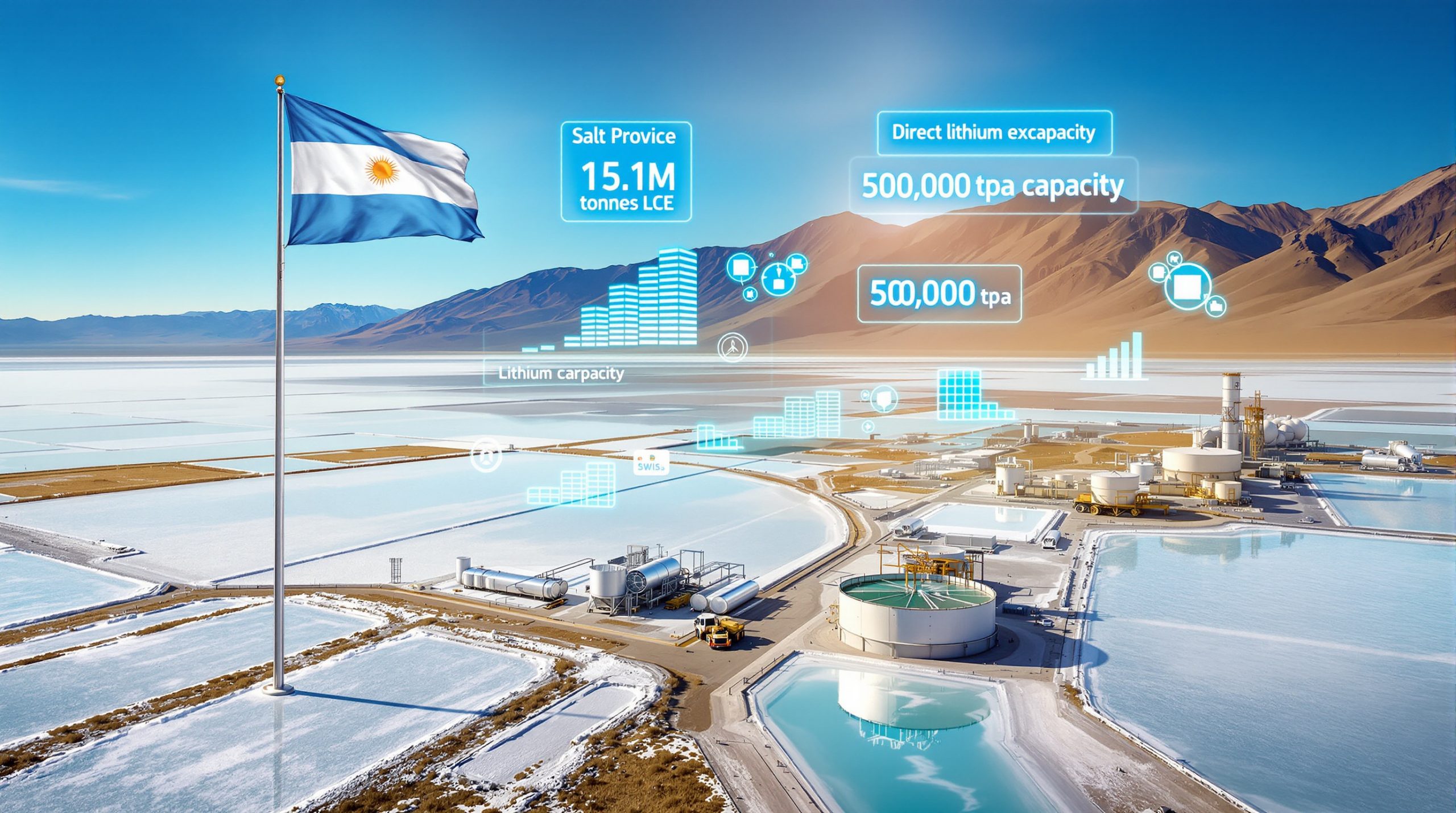Africa's Strategic Position at the 2025 G20: Transforming Critical Minerals Governance
The African continent stands at a pivotal juncture as the 2025 G20 summit approaches in Johannesburg, presenting an unprecedented opportunity for Africa leverage G20 critical minerals discussions and reshape the global governance landscape. This historic gathering marks the first time the influential economic forum convenes on African soil, coinciding with the African Union's elevation to full G20 membership status.
Africa's mineral wealth represents far more than raw extraction potential. The continent controls approximately 30% of worldwide critical mineral reserves, including 70% of global cobalt production through the Democratic Republic of Congo and 80% of platinum reserves concentrated in South Africa's Bushveld Complex. These resources generated nearly $50 billion in mining value during 2024, with industry projections suggesting growth toward $83 billion by 2040.
However, the current extraction model perpetuates economic dependency rather than fostering sustainable development. Africa captures merely 15-25% of mineral value through mining operations while exporting 75-85% as raw materials to international markets. This pattern results in $20 billion in annual losses through illicit financial flows from African mining operations, according to African Union and World Bank estimates.
Understanding Africa's Mineral Wealth Potential
Africa's geological endowment positions the continent as essential to global supply chains supporting technological innovation and climate transition objectives. The Democratic Republic of Congo's cobalt production underpins electric vehicle battery manufacturing, while South Africa's platinum group metals remain critical for hydrogen fuel cell development and catalytic applications.
The continent's critical mineral portfolio extends beyond headline commodities to include:
- Battery metals: Cobalt, lithium, nickel, manganese for energy storage systems
- Energy transition metals: Platinum, palladium, rhodium for hydrogen economy infrastructure
- Industrial metals: Copper, rare earth elements, chromium for manufacturing applications
- Emerging demand minerals: Graphite, vanadium for specialised technological applications
Regional distribution patterns reveal significant geographic concentration risks. Central Africa dominates cobalt supply through DRC operations, while Southern Africa controls platinum group metals through South African mining complexes. Furthermore, South Africa beneficiation initiatives demonstrate how local processing capabilities can capture greater value from these strategic resources.
East Africa contributes emerging lithium production, particularly from Zimbabwe operations, though current African lithium output represents approximately 5-7% of global production rather than higher estimates sometimes cited. However, trade restrictions like the DRC cobalt export ban highlight how supply-side policies can influence global market dynamics.
Employment implications remain substantial yet underexplored. African mining currently provides approximately 7.5 million direct jobs and supports 30-40 million indirect livelihoods, representing roughly 2-4% of the continental population. Local value addition initiatives could theoretically increase employment by 20-30% through processing facility development.
What Makes the 2025 G20 Summit Historically Significant?
First African-Hosted G20 Creates Unprecedented Platform
The November 22-23, 2025 Johannesburg summit represents more than symbolic recognition of African economic importance. The G20 collectively accounts for 85% of global economic output, 75% of international trade, and 67% of world population, providing Africa with direct access to decision-making processes affecting mineral governance frameworks.
This institutional platform enables the continent to leverage G20 critical minerals initiatives by transitioning from reactive policy responses to proactive agenda-setting. Previous G20 summits have addressed African development concerns peripherally, often through aid and debt relief discussions rather than partnership frameworks recognising Africa as a strategic economic partner.
South Africa's G20 presidency explicitly prioritises critical minerals as central to continental industrialisation objectives, global energy transition requirements, and inclusive economic growth strategies. This agenda-setting authority represents a fundamental shift from external actors determining Africa's mineral governance parameters.
African Union's Full Membership Amplifies Continental Voice
The African Union's August 2023 elevation to full G20 membership creates institutional mechanisms for coordinated African positions across 55 member states representing 1.4 billion people and approximately $3.4 trillion in collective GDP. This represents the first regional organisation to achieve equal institutional standing with individual G20 members.
However, coordination challenges remain substantial. The AU's historical difficulty in enforcing member compliance on policy commitments suggests potential limitations in presenting unified positions on complex mineral governance issues where member states have divergent interests.
Mineral-rich African countries face different negotiating priorities than mineral-importing nations, while countries at various development stages may prioritise immediate revenue generation over longer-term value addition strategies. Managing these tensions requires sophisticated diplomatic coordination mechanisms.
How Can Africa Transform from Resource Extractor to Industrial Hub?
Local Value Addition Framework Development
Current extraction patterns perpetuate colonial-era economic relationships where Africa provides raw materials for processing in industrialised economies. Establishing local processing capabilities could generate 2 million jobs by 2035 while capturing significantly more value from mineral wealth through integrated supply chain development.
The value multiplication potential across processing stages demonstrates transformation opportunities:
| Processing Stage | Current African Participation | Potential with Investment | Value Multiplier |
|---|---|---|---|
| Mining/Extraction | 95% (primary production) | 95% | 1.0x |
| Beneficiation | 25-40% (selective) | 60-80% | 1.5-2.0x |
| Smelting | 15-30% (limited) | 40-60% | 2.5-3.5x |
| Refining | 5-15% (minimal) | 30-50% | 3.0-4.5x |
| Manufacturing | <5% (rare) | 10-25% | 5.0-8.0x |
Technical capacity exists within various African countries, but coordination failures prevent optimal resource deployment. Moreover, supply disruptions like the Namibia uranium halt underscore the importance of diversified processing capabilities across the continent.
Regional cooperation among mineral-rich African nations can reduce harmful internal competition while building integrated supply chains supporting continental industrialisation objectives.
Strategic Industrial Policy Implementation
Existing frameworks like the Africa Mining Vision and Africa Green Minerals Strategy provide policy foundations, though implementation remains limited due to governance challenges and insufficient technical capacity at national levels. Additionally, the critical minerals pivot towards strategic resource development requires coordinated continental approaches.
The Africa Minerals Development Centre represents institutional progress, though only Guinea, Mali, Zambia, and Nigeria have ratified enabling statutes. Full implementation requires 11 additional state ratifications, highlighting coordination challenges constraining continental mineral governance initiatives.
Projects like the Lobito Corridor and EU-Namibia critical minerals agreements demonstrate emerging models for value addition, though they also reveal Africa's limited capacity to independently set cooperation terms with external partners.
What Are the Key Negotiation Advantages for African Countries?
Africa's negotiating position strengthens through supply concentration in strategic minerals essential to global economic transformation. The continent's dominance in specific commodities creates leverage opportunities when deployed strategically through coordinated approaches.
Cobalt Supply Control: The Democratic Republic of Congo's 70% share of global cobalt production positions the country as essential to electric vehicle battery manufacturing. However, this concentration also creates vulnerability to external pressure and highlights the importance of regional coordination to prevent individual country manipulation.
Platinum Group Metals Dominance: South Africa's 80% control of global platinum reserves provides substantial leverage in hydrogen economy development and catalytic converter manufacturing. The Bushveld Complex's unique geological characteristics make alternative supply sources technically challenging and economically unviable in medium-term timeframes.
Copper Infrastructure Importance: Africa's 17% share of global copper production, concentrated primarily in Zambia and DRC, supports global infrastructure development and renewable energy system deployment. Copper demand projections suggest significant growth opportunities supporting continental development objectives.
Lithium Growth Potential: While current African lithium production represents approximately 5-7% of global output, primarily from Zimbabwe operations, geological surveys indicate substantial unexploited reserves across multiple African countries supporting future market position expansion.
How Should Africa Counter External Pressure from Major Powers?
Addressing Chinese Processing Dominance
China currently dominates critical mineral processing into value-added products, creating supply chain vulnerabilities for other global economies while limiting African value capture opportunities. Chinese companies control approximately 60-70% of global lithium processing, 80% of rare earth processing, and significant shares of cobalt refining capacity.
This processing dominance enables China to purchase raw materials from African countries at commodity prices while capturing value-added processing margins. Africa can leverage this dependency by developing alternative processing capabilities and negotiating more favourable terms requiring technology transfer and local investment commitments.
Strategic partnerships with non-Chinese actors seeking supply chain diversification create opportunities for African countries to negotiate improved terms while developing domestic technical capabilities supporting long-term industrialisation objectives.
Responding to Western Mineral Security Initiatives
The United States' Inflation Reduction Act, European Union's Critical Raw Materials Act, and the Minerals Security Partnership represent coordinated efforts to reduce Chinese supply chain dependence while securing reliable access to critical minerals supporting energy transition objectives.
These initiatives create opportunities for African countries to position themselves as reliable alternative suppliers while demanding technology transfer, local processing requirements, and development financing commitments as conditions for long-term supply agreements. Furthermore, partnerships like the Namibia-Russia nuclear ties demonstrate how African nations can diversify their strategic relationships.
However, Western mineral security initiatives often prioritise supply reliability over African development objectives, requiring careful negotiation to ensure partnerships support continental industrialisation rather than perpetuating raw material extraction patterns under new management.
What Institutional Frameworks Support African Mineral Governance?
Africa Minerals Development Centre Implementation
The Africa Minerals Development Centre represents the primary institutional mechanism for implementing the Africa Mining Vision across continental member states. However, ratification progress remains insufficient, with only four countries (Guinea, Mali, Zambia, and Nigeria) completing necessary legislative processes.
Full implementation requires 11 total ratifications, suggesting political commitment challenges constraining continental mineral governance coordination. Without institutional capacity for policy coordination, individual African countries remain vulnerable to external pressure and internal competition undermining collective bargaining positions.
Technical capacity development within the Centre requires substantial investment in geological survey capabilities, mining engineering expertise, and policy coordination mechanisms supporting evidence-based decision-making across diverse national contexts.
Regional Integration Through Mineral Corridors
Infrastructure development projects like the Lobito Corridor connecting DRC and Zambian mining regions to Atlantic ports demonstrate regional integration potential while highlighting coordination challenges requiring multilateral cooperation.
The corridor project involves Angola, DRC, and Zambia coordination for rail and port infrastructure supporting mineral exports, though value addition components remain limited without complementary processing facility development.
Similar corridor projects across other African regions could support integrated supply chain development, though success requires sustained political commitment and technical capacity often constrained by governance challenges and resource limitations.
Why Is Timing Critical for Africa's Mineral Strategy?
Meeting Paris Agreement climate goals requires quadrupling critical mineral supplies for renewables by 2040, necessitating $800 billion in new investment across global supply chains. This massive capital requirement creates both unprecedented opportunity and significant risk if governance frameworks fail to ensure equitable benefit distribution.
The International Energy Agency projects that clean energy technologies will account for 50% of global mineral demand growth through 2040, with electric vehicles and battery storage representing primary demand drivers. Africa's geological endowment positions the continent as essential to meeting these requirements, though current governance frameworks inadequately capture development benefits.
Development Urgency Highlighted by Human Development Gaps
The Democratic Republic of Congo exemplifies the resource curse phenomenon, producing 70% of global cobalt while ranking 180th out of 193 countries on the Human Development Index. This stark contrast underscores the imperative for transformative governance approaches ensuring mineral wealth translates into broad-based development outcomes.
Similar patterns exist across other mineral-rich African countries where extractive industries generate substantial export revenues without corresponding improvements in education, healthcare, or infrastructure development supporting broader economic transformation.
Without strategic intervention, current mineral boom cycles risk perpetuating inequality and social instability rather than supporting sustainable development objectives aligned with continental integration and industrialisation priorities.
What Specific Outcomes Should Africa Pursue at G20?
The 2025 Johannesburg summit presents opportunities to establish frameworks addressing multiple development challenges through coordinated approaches linking mineral governance to broader economic transformation objectives. Consequently, the ability for Africa leverage G20 critical minerals discussions becomes crucial for achieving sustainable development goals.
Priority Framework Elements:
- Debt sustainability mechanisms linking mineral revenues to development financing
- Climate finance mobilisation supporting green industrialisation initiatives
- Just energy transition frameworks ensuring local community benefits
- Technology transfer requirements embedded in foreign investment agreements
- Revenue transparency and anti-corruption measures supporting governance improvements
Development Financing Integration: Mineral revenue management frameworks should integrate with international development financing mechanisms, enabling African countries to leverage natural resource wealth for infrastructure development and human capital investments supporting economic diversification.
Climate Justice Frameworks: Energy transition initiatives must include provisions ensuring African countries benefit from global decarbonisation rather than bearing costs associated with external climate policies while remaining excluded from value-added economic activities.
Technology Transfer Requirements: Foreign investment agreements should mandate technology transfer and local capacity building as conditions for resource access, supporting long-term industrialisation objectives rather than perpetuating raw material extraction patterns.
How Can South-South Cooperation Strengthen Africa's Position?
Strategic cooperation among developing nations offers alternatives to traditional North-South dependency relationships constraining African policy autonomy and development strategy flexibility. Coordinated approaches with other mineral-rich developing countries can establish common negotiating positions and share best practices for resource governance.
Brazil's experience with mining sector regulation and local content requirements provides relevant models for African countries seeking to capture greater value from mineral extraction. Indonesia's nickel processing requirements demonstrate how supply-side policies can influence global value chain structures.
BRICS cooperation mechanisms offer institutional frameworks for South-South coordination on mineral governance issues, though African participation requires enhanced technical capacity and political coordination across diverse national interests and development priorities.
Regional organisations including ECOWAS, SADC, and the East African Community provide platforms for coordinating mineral governance policies across subregional contexts, though effectiveness requires strengthened institutional capacity and sustained political commitment from member states.
What Long-Term Vision Should Guide African Mineral Policy?
Africa's G20 engagement should advance a comprehensive vision balancing security of supply concerns with Sustainable Development Goals, ensuring critical minerals drive development and climate justice rather than perpetuating inequality and exploitation patterns from previous resource extraction cycles. The G20's high-level commitments provide a framework for ensuring these objectives are met.
The continent's unique position as both a major mineral supplier and a region requiring significant development investment creates opportunities for innovative partnership models benefiting all stakeholders while prioritising African development needs and regional integration objectives.
Industrialisation Integration: Mineral governance frameworks should explicitly support continental industrialisation through the African Continental Free Trade Area, enabling regional value chains and reducing dependence on external processing capacity while creating employment opportunities across multiple African countries.
Environmental Sustainability: Mining operations must integrate environmental protection and community development requirements, ensuring extractive activities support rather than undermine long-term development objectives and climate adaptation requirements across diverse African ecological contexts.
Governance Transparency: Revenue management and corporate accountability mechanisms require strengthening to prevent illicit financial flows and ensure mineral wealth translates into tangible development outcomes supporting education, healthcare, and infrastructure development priorities.
The 2025 G20 summit represents a historic opportunity to leverage G20 critical minerals frameworks as instruments of transformation rather than continued dependency. Success requires coordinated action among African Union member states, strategic engagement with international partners, and sustained commitment to governance improvements supporting equitable development outcomes.
Disclaimer: This analysis includes projections and strategic recommendations based on current trends and available data. Actual outcomes may vary based on political developments, market conditions, and implementation capacity across diverse African contexts. Readers should consult additional sources for investment and policy decision-making.
Ready to Capitalise on Africa's Critical Minerals Transformation?
Discovery Alert's proprietary Discovery IQ model delivers real-time notifications on significant ASX mineral discoveries, instantly empowering subscribers to identify actionable opportunities as global demand for critical minerals accelerates. Understand why major mineral discoveries can lead to exceptional market returns by exploring Discovery Alert's dedicated discoveries page, showcasing historic examples of transformative outcomes from companies that capitalised on strategic resource developments.




